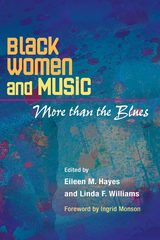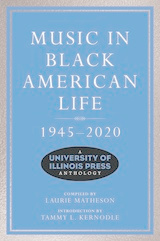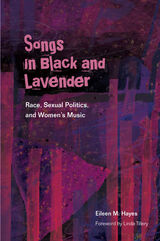3 books about Hayes, Eileen M.

Black Women and Music
More Than the Blues
Edited by Eileen M. Hayes and Linda F. Williams
University of Illinois Press, 2006
This collection is the first interdisciplinary volume to examine black women’s negotiation of race and gender in African American music. Contributors address black women’s activity in musical arenas that pre- and postdate the emergence of the vaudeville blues singers of the 1920s. Throughout, the authors illustrate black women’s advocacy of themselves as blacks and as women in music. Feminist? Black feminist? The editors take care to stress that each term warrants interrogation: “Black women can and have forged, often, but not always––and not everywhere the same across time––identities that are supple enough to accommodate a sense of female empowerment through ‘musicking’ in tandem with their sensitivities to black racial allegiances.”
Individual essays concern the experiences of black women in classical music and in contemporary blues, the history of black female gospel-inflected voices in the Broadway musical, and "hip-hop feminism" and its complications. Focusing on under-examined contexts, authors introduce readers to the work of a prominent gospel announcer, women’s music festivals (predominantly lesbian), and to women’s involvement in an early avant-garde black music collective. In contradistinction to a compilation of biographies, this volume critically illuminates themes of black authenticity, sexual politics, access, racial uplift through music, and the challenges of writing (black) feminist biography. Black Women and Music is a strong reminder that black women have been and are both social actors and artists contributing to African American thought.
Individual essays concern the experiences of black women in classical music and in contemporary blues, the history of black female gospel-inflected voices in the Broadway musical, and "hip-hop feminism" and its complications. Focusing on under-examined contexts, authors introduce readers to the work of a prominent gospel announcer, women’s music festivals (predominantly lesbian), and to women’s involvement in an early avant-garde black music collective. In contradistinction to a compilation of biographies, this volume critically illuminates themes of black authenticity, sexual politics, access, racial uplift through music, and the challenges of writing (black) feminist biography. Black Women and Music is a strong reminder that black women have been and are both social actors and artists contributing to African American thought.
[more]

Music in Black American Life, 1945-2020
A University of Illinois Press Anthology
Compiled by Laurie Matheson. Introduction by Tammy L. Kernodle
University of Illinois Press, 2022
This second volume of Music in Black American Life offers research and analysis that originally appeared in the journals American Music and Black Music Research Journal, and in two book series published by the University of Illinois Press: Music in American Life, and African American Music in Global Perspective. In this collection, a group of predominately Black scholars explores a variety of topics with works that pioneered new methodologies and modes of inquiry for hearing and studying Black music. These extracts and articles examine the World War II jazz scene; look at female artists like gospel star Shirley Caesar and jazz musician-arranger Melba Liston; illuminate the South Bronx milieu that folded many forms of black expressive culture into rap; and explain Hamilton's massive success as part of the "tanning" of American culture that began when Black music entered the mainstream.
Part sourcebook and part survey of historic music scholarship, Music in Black American Life, 1945–2020 collects groundbreaking work that redefines our view of Black music and its place in American music history.
Contributors: Nelson George, Wayne Everett Goins, Claudrena N. Harold, Eileen M. Hayes, Loren Kajikawa, Robin D. G. Kelley, Tammy L. Kernodle, Cheryl L. Keyes, Gwendolyn Pough, Bernice Johnson Reagon, Mark Tucker, and Sherrie Tucker
[more]

Songs in Black and Lavender
Race, Sexual Politics, and Women's Music
Eileen M. Hayes, Foreword by Linda Tillery
University of Illinois Press, 2010
Drawing on fieldwork conducted at eight women's music festivals, Eileen M. Hayes shows how studying these festivals--attended by predominately white lesbians--provides critical insight into the role of music and lesbian community formation. She argues that the women's music festival is a significant institutional site for the emergence of black feminist consciousness in the contemporary period. Hayes also offers sage perspectives on black women's involvement in the women's music festival scene, the ramifications of their performances as drag kings in those environments, and the challenges and joys of a black lesbian retreat based on the feminist festival model. With acuity and candor, longtime feminist activist Hayes elucidates why this music scene matters. Veteran vocalist, percussionist, producer, and cultural historian Linda Tillery provides a foreword.
[more]
READERS
Browse our collection.
PUBLISHERS
See BiblioVault's publisher services.
STUDENT SERVICES
Files for college accessibility offices.
UChicago Accessibility Resources
home | accessibility | search | about | contact us
BiblioVault ® 2001 - 2024
The University of Chicago Press









